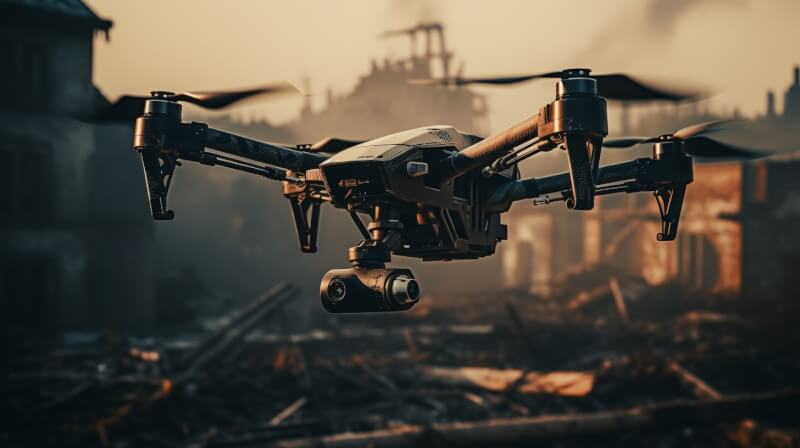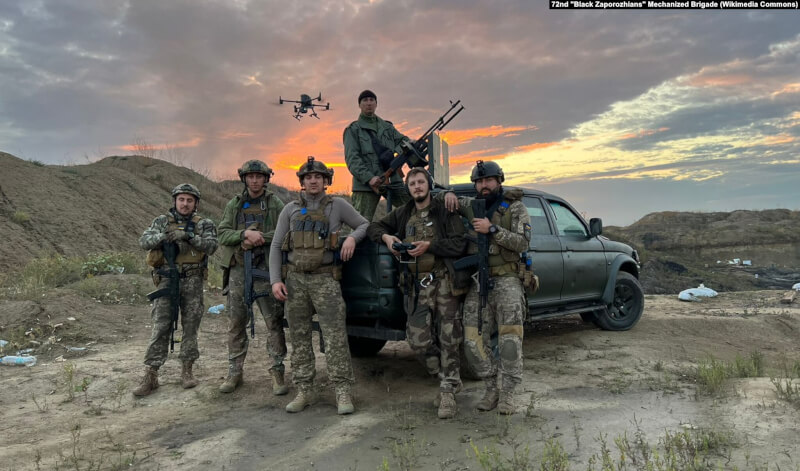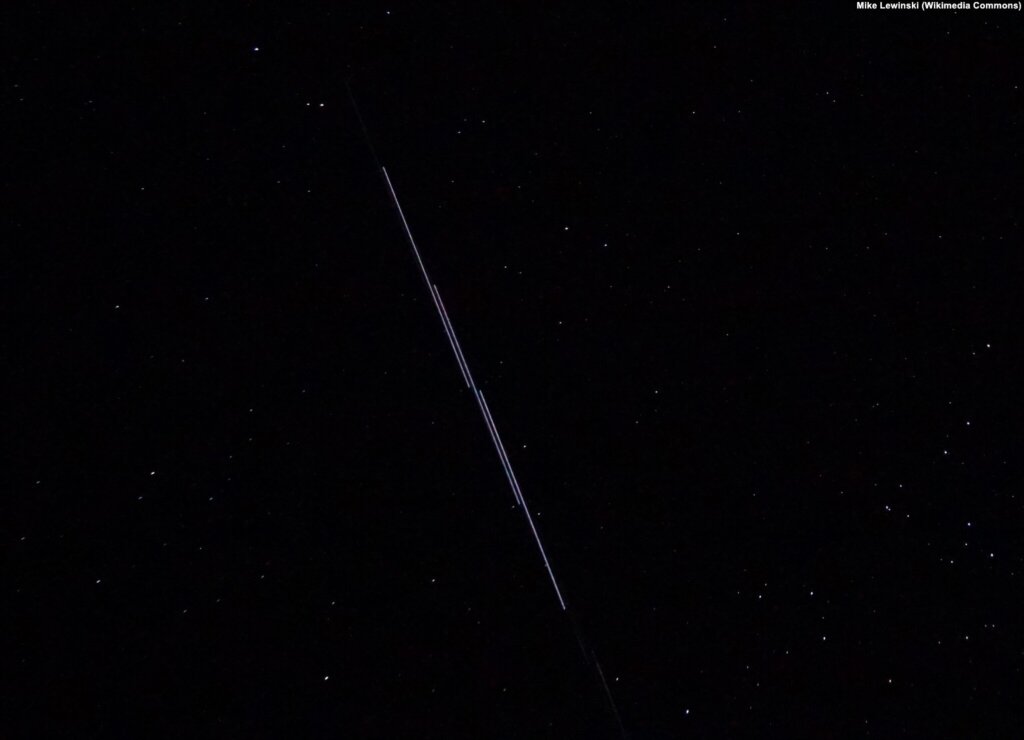
Small drones, many of them satellite-dependent, have had a big impact in Ukraine’s defence against Russia’s invading forces.
[Corporate handout]
“Congress needs to investigate what’s happened here, and whether we have adequate tools to make sure foreign policy is conducted by the government and not by one billionaire,” the Massachusetts Democrat said on Sept. 11, 2023.
In his new biography titled Elon Musk, author Walter Isaacson describes how a sneak attack on Russia’s Black Sea fleet by a Ukrainian drone was disrupted after the Tesla and SpaceX CEO ordered engineers to shut down satellite access over Crimea.
The tech billionaire told Isaacson he feared the Ukrainian attack would provoke Russian President Vladimir Putin into launching a nuclear war, which he has refused to rule out.
Isaacson has since clarified in a post on the former Twitter platform, now owned by Musk and known as X, that “the Ukrainians THOUGHT coverage was enabled all the way to Crimea, but it was not.”
Finally, Musk chimed in: “There was an emergency request from government authorities to activate Starlink all the way to Sevastopol. The obvious intent being to sink most of the Russian fleet at anchor. If I had agreed to their request, then SpaceX would be explicitly complicit in a major act of war and conflict escalation.”
Musk delivered Starlink terminals to Ukraine for free in the early days of Russia’s unprovoked invasion as Western governments rallied to supply Kyiv with artillery and air defence systems.
Musk eventually soured on the arrangement, saying “Starlink was not meant to be involved in wars,” and at one point threatened to withdraw access altogether.
Starlink “was so people can watch Netflix and chill and get online for school and do good peaceful things, not drone strikes,” he said.

Members of Ukraine’s 72nd Black Zaporozhians mobile aerial reconnaissance group pose with their DJI Matrice 300 “bomber.” Connected via Starlink satellite, it allows Ukrainian artillery teams to target Russian positions by dropping anti-tank munitions, often in silence and at night.
[Black Zaporozhians/Wikimedia]
“As a result, civilians, children are being killed. This is the price of a cocktail of ignorance and big ego.”
It wasn’t the first such incident.
Ukrainian forces discovered in October 2022 that Starlink ceased to function when they entered newly liberated areas, depriving them of critical communications capability at vulnerable moments.
In February 2023, Starlink imposed more restrictions, saying the system should not be used for offensive purposes such as providing communications for controlling drones carrying out attacks on Russian troops.
The U.S. military has since contracted the continued support of the SpaceX service. The Pentagon won’t disclose details of the deal, citing operational security.
But the Crimean incident, and the fact the Pentagon has become reliant on the service, have suddenly got the attention of people in high places, starting in Ukraine, where a top aide to President Volodymyr Zelenskyy lashed out at Musk.
“By not allowing Ukrainian drones to destroy part of the Russian military fleet via Starlink interference, Elon Musk allowed this fleet to fire Kalibr missiles at Ukrainian cities,” declared Mykhailo Podolyak.
“As a result, civilians, children are being killed. This is the price of a cocktail of ignorance and big ego.”
U.S. Air Force Secretary Frank Kendall said the situation has raised questions as to whether the U.S. military needs to be more explicit in future contracts that services or products it purchases could be used in war.
“If we’re going to rely upon commercial architectures or commercial systems for operational use, then we have to have some assurances that they’re going to be available,” Kendall told a convention roundtable. “We have to have that.
“Otherwise they are a convenience and maybe an economy in peacetime, but they’re not something we can rely upon in wartime.”
Putin, on the other hand, had high praise for Musk, touting him as an “outstanding person… an active and talented businessman and he is succeeding a lot, including with the support of the American state.”
Guardian newspaper columnist Keir Giles contends the underlying issue warrants more scrutiny. SpaceX, he writes, is far from the only technology company playing a vital role in Ukraine’s fight. Household names such as Amazon, Google, Microsoft and others have been “essential” to the country’s defence.

A chain of Starlink satellites passes over Tres Piedras, New Mexico.
[Mike Lewinski/Wikimedia]
Companies are providing capabilities that are vital to Ukraine’s national survival because they choose to.
“The key role of tech companies—and the people working for and with them—in this war raises new questions about the status of private industry and civilians in wartime,” said Giles. “Private companies are playing major roles in cyber, telecommunications, national resilience and more—but, just like SpaceX, none of them have an absolute duty to do so. Simply put, companies are providing capabilities that are vital to Ukraine’s national survival because they choose to, not because they are beholden to any of the states involved in the conflict.”
Some examples of companies providing free or Western government-backed services:
- Amazon and its cloud services were crucial in evacuating Ukrainian government data before the invasion.
- Information technology companies such as Microsoft and ESET have provided critical cyber-protection to Ukrainian government and civilian networks against Russian attack.
- Google provides support services for Ukrainian government functions and protection for government websites and embassies worldwide.
“The reason why none of these have hit the headlines in the same way as Starlink is not just because their support is provided quietly in the background,” Giles writes. “It’s also because, unlike Starlink, all of these companies have made a clear choice as to which side they are on. They concluded that their own values, and their duty to their other customers, mean that they must back Ukraine.”
He said the Starlink issues highlight “the vulnerabilities that come with dependence on this kind of goodwill.”
“Twitter and Starlink under Musk are the primary case study for major tech platforms that hold power without accountability,” Giles writes. “Their distinctive ownership structure means that Musk’s personal decisions can easily cause lives to be saved or lost.
“In all these cases, there are vital lessons for any other conflict where a state might be dependent on the goodwill of private industry: a critical warfighting capability can be hostage to a terms-of-service violation. What is more, in a future, more ambiguous conflict, private companies’ loyalties could cross borders and they could find themselves offering services to both sides. This has direct implications for the defence of western societies.”

Connected via a Starlink satellite, this modified DJI Matrice 300 allows Ukrainian artillery teams to target Russian positions by dropping anti-tank munitions.
[Black Zaporozhians/Wikimedia]
Advertisement





















